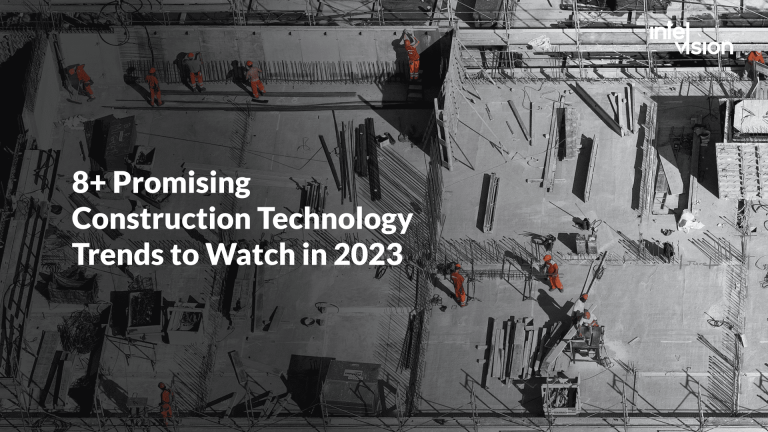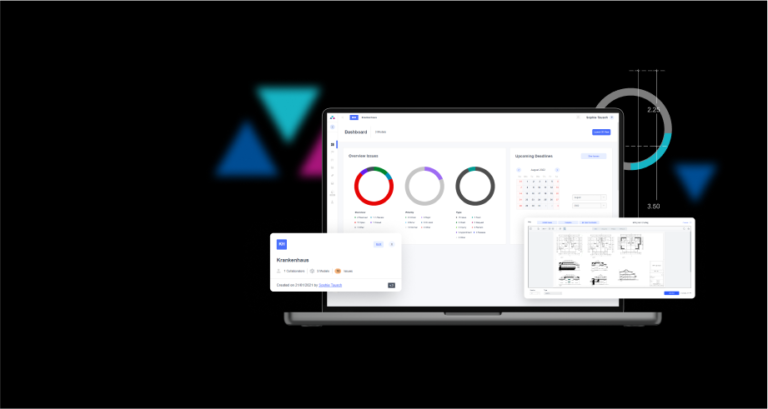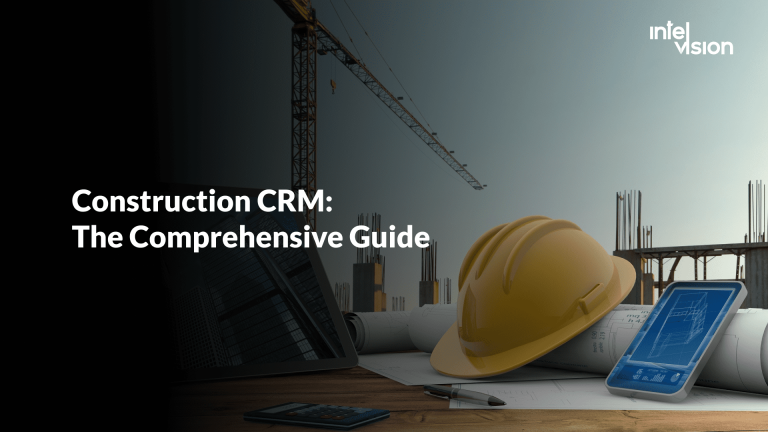
Cutting-Edge CRM in Construction: The Comprehensive Guide
Fact: acquiring a new customer is 5–10 times more expensive than selling a product to an existing customer. However, the proper software can help construction companies close deals and retain customers. While the industry is not traditionally associated with cutting-edge technology, that is changing. An example is the use of sales tools such as customer relationship management (CRM).
In this post, we will highlight how CRM may help you streamline your construction business and sales operations and how to choose the right one for your end goals.
What is CRM in Construction
What does CRM mean in construction? CRM is an approach to managing relationships between a company and its leads, partners, and customers. The key purpose of a customer relationship management system is to help you track and manage client relationships. It can also help your business become more efficient since CRMs improve internal processes with automation, team collaboration tools as well as in-depth insights and reports.
CRM in construction isn’t limited to managing exclusively customers. Companies in the construction industry deal with a wide range of stakeholders, such as partners, general contractors, and other construction professionals. You can track all the relationships and move complex pieces within a CRM. Moreover, with the help of mobile application capabilities your team can access crucial information and track projects in real-time.
What Issues a CRM Implementation Can Help With
Unfortunately, many construction companies rely on Outlook and Excel to track this information, resulting in employees working from multiple, disparate documents. None of them provide an accurate, up-to-date picture of the firm’s current relationships.
Meanwhile, without a clear understanding of previous conversations, employees often repeat questions or make contradictory promises, which can damage a company’s reputation with clients and partners. A construction-centric CRM can prevent this issue by making accurate, up-to-date, and actionable relationships easily accessible.
With CRM in the construction industry, you can constantly monitor the customers’ behavior, call them for action, and interact with them promptly. Another point of CRM is working on customer retention.
Key Benefits of CRM System For Construction Companies
For those who work with CRM in construction, it is hard to imagine a world without it. The key benefits of using customer relationship management are:
- Quick return on investment (ROI). The CRM system eliminates human errors that lead to losses. These mistakes can cost hundreds of thousands in monetary terms.
- Trustworthy reporting. Construction CRM system helps you go deeper with all your data and metrics, including those from other sources.
- Proactive service. CRM software can improve a sales team‘s outreach efforts or customer service’s ability to help customers.
- Efficiency enhanced by automation. With CRM, marketers can spend more time creating campaigns that resonate with their target audience, analyzing data, and testing different strategies based on analytics. Sales managers can focus on selling the right product or service to customers. Customer service experts can dedicate their time to working with clients with questions, problems, or more complex needs.
- Simplified collaboration. Construction CRM platforms contain records of conversations, interactions, needs, notes, and contact information. And if it is cloud-based, it’s always up to date, and your colleagues can easily look at these records to make effective decisions.
Finally, the proper construction CRM solution improves the company’s overall level of efficiency.
According to Software Advice, 74% of CRM users said their system offered improved access to customer data. Around 47% percent said it had a significant impact on customer retention, and 47% said it had an impact on customer satisfaction.
4 Most Important Features CRM Features to Create Successful Customer Relationships in Construction
To successfully overcome the unique challenges construction companies face, you will want to look for a few specific features in your CRM. Here are some of the features we recommend prioritizing.
Activity & document management
True, you don’t have total control over whether a deal will close. However, you can control the tasks your team carries out, such as making phone calls, sending emails, and so more, to help boost your chances of signing a new client. You can also use CRM for construction to keep track of any necessary steps needed to maintain compliance with regulations.
Contact management
You need to have all of the data in an easy-to-navigate database. This would include contact details and customer data such as company information and activity records. Some CRM solutions also allow you to enrich this information, pulling data from LinkedIn and other social media platforms.
Data analytics
The right analytics will help you understand what it takes to close a deal, as well as the challenges that might prevent a successful outcome.
Forecasting
A CRM platform can help you forecast what deals (and when) you can expect to close, and how much those deals will be worth.
Therefore, managers can see for themselves what deals they need to focus on and avoid any last-minute issues.
How to Choose the Best Construction CRM Software
How to choose a CRM system for implementation in commercial construction companies or the proper construction software development service vendor?
- Determine why you need a CRM. The answer must contain money. For example: “We lose N orders a week because of… It means $… After the implementation of the CRM system, we won’t have these losses.”
- Determine the fundamental changes that CRM should bring. For example: “We need the platform to … If this did not happen, we would …”
- Formulate the previous two stages in the form of a flowchart of your business processes, and send it on to the CRM provider or software development service vendor. Ask the provider to estimate what will have to be developed from scratch.
What else to consider?
Review customer references of the potential CRM provider
Ensure transparency and reliability of cooperation, and technical and commercial support from the provider.
Keep in mind industry-specific integrations
Integrations such as email marketing, accounting, and other business tools are incredibly important when it comes to CRM software. According to different research, integrating a CRM with data from internal and external sources can increase productivity and grow construction businesses by up to 30%.
And vice versa, if there are no integrations, or they are complicated to set up, your team will likely have to update records separately. This increases the chance of key data being incorrect or left out. Nonetheless, many vendors don’t handle integrations well: 49% of CRM users said integrating with other systems is a challenge for them.
Choose between cloud-based and onsite CRM
CRM solutions are commonly hosted in the cloud. This is generally the easiest option, eliminating the need to invest in the infrastructure including necessary hardware and IT support needed to care for the setup and maintenance of an on-site CRM for construction.
However, if you want to manage your CRM in the construction industry yourself, you may opt for an on-site solution. This will likely involve higher upfront costs and require ongoing support but it offers added control over data, with no reliance on external parties.
Consider mobile functionality pros
About 81% of CRM software users said they access their CRM using multiple types of devices. Even if you think you won’t probably need mobile access, it is good to have the option. Moreover, mobile accessibility allows you to capture key lead information while on the go. And that is crucial for ensuring important information is not forgotten.
The CRM platform should also allow you to automatically log phone calls, enter notes using voice-to-text, list and search your projects, organize, search, and filter contacts, companies, projects, and calls, receive push notifications as well as review your upcoming and past due call logs.
How to Implement a CRM in Your Construction Company
Where to start and what stages to divide the CRM software implementation in your company?
- Determine the goals of CRM implementation and the mechanism for achieving them. This task should be carried out by a manager whose department will be the direct “consumer” of the construction management software.
- Analyze the processes that CRM automates. Find answers to questions: how the processes in the company are built, what is wrong with them, why this is happening, and how CRM can help fix it.
- Discuss your ideas with technical experts. Generally, these are representatives of the supplier company that will implement the CRM system.
- Provide the employees with the training and resources they need to properly use your CRM platform. Allow them to familiarize themselves with the CRM for construction, and give clear instructions on how to use it effectively for your specific requirements. For larger organizations, it will be best to carry out a phased deployment.
With your teams fully prepped, you are finally ready to get up and running. While the way you use your CRM system will change and improve over time, you can get yourself off to a good start by:
- Customizing the setup to match your process.
- Setting up automation (emails, data entry, and more) to ensure no important tasks are missed.
- Setting up reports for your metrics.
- Setting up forecasting to improve future planning.
- Importing any existing data or adding new contacts.
With the construction management software properly set up, you are ready to start using it to track your deals, manage your clients and projects as well as analyze your metrics for better results.
Grow With a CRM, Not Excel. Why Custom CRM Development is the Best Option
For custom CRM software development we recommend choosing Intelvision, and here’s why:
- We offer individual client relationship management solutions taking into account business features, specifics, and tasks.
- We don’t impose unnecessary services nor make hidden payments. Instead, we work transparently and openly.
- We focus on the ease of use of the system so that each employee can easily work with it.
- We offer point CRM systems for each construction company that will help automate business processes and improve management in its unique way.
- We integrate third-party services and modules.
Our task is to make the management of construction businesses simple, convenient, and functional. Therefore, we develop easy-to-learn, easy-to-use CRM for construction because the point of technology is to make life easier.
Access to the history of calls, construction documentation, and the ability to plan and control construction dates and supplies of materials一you will find the necessary tools in the CRM system. Intelvision provides all the features you need, and much more, allowing you to overcome challenges, streamline workflows, and enhance client relationships within a single platform.
Final Thoughts
An effective CRM system for a construction company is a reliable tool that allows you to combine all the information and quickly solve all the tasks. This significantly increases the efficiency and the speed of putting objects into operation, which directly affects the construction firm‘s income. Here are examples of how CRM can help a construction company solves its tasks:
- The task is to study the entire course of work on the construction site. With CRM all information will be grouped, and only authorized employees have access to project data. From both your smartphone or computer, you can view reports, work plans, progress, and other documentation.
- The task is to give instructions to the team. For this, you won’t need to hold planning meetings, especially if the employees of the company work at different sites. Make detailed plans and distribute tasks among employees online.
- You need access to the contacts database. Clients used to interact with a specific manager, but your manager suddenly decided to quit or, for various reasons, cannot keep working. Communication with the client is interrupted. The CRM system for construction excludes such options. All information about the client and the archive of conversations with him are stored in the system.
These are just a few examples. Construction management software is a powerful tool for complete control over the business, management, and automation.









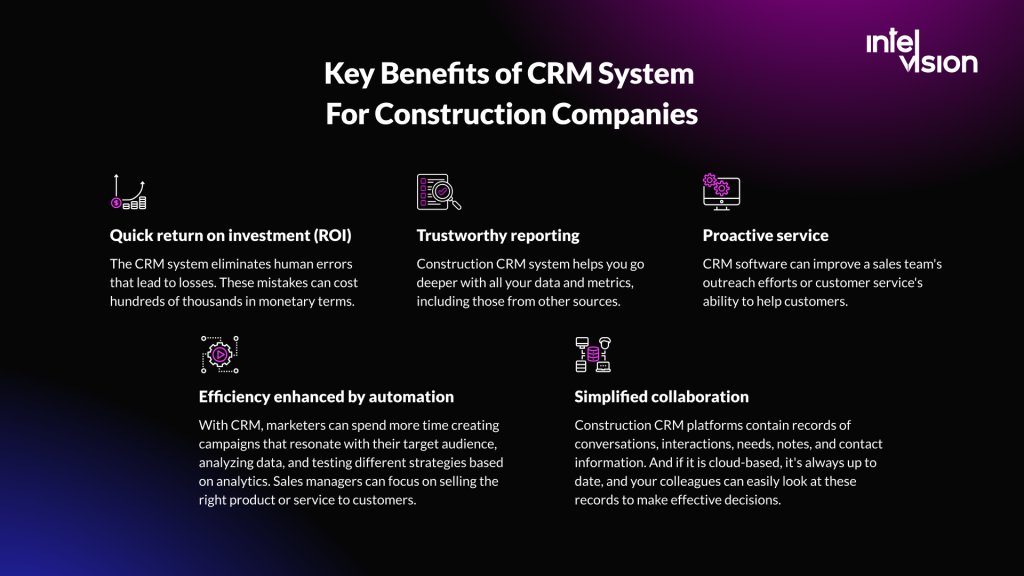
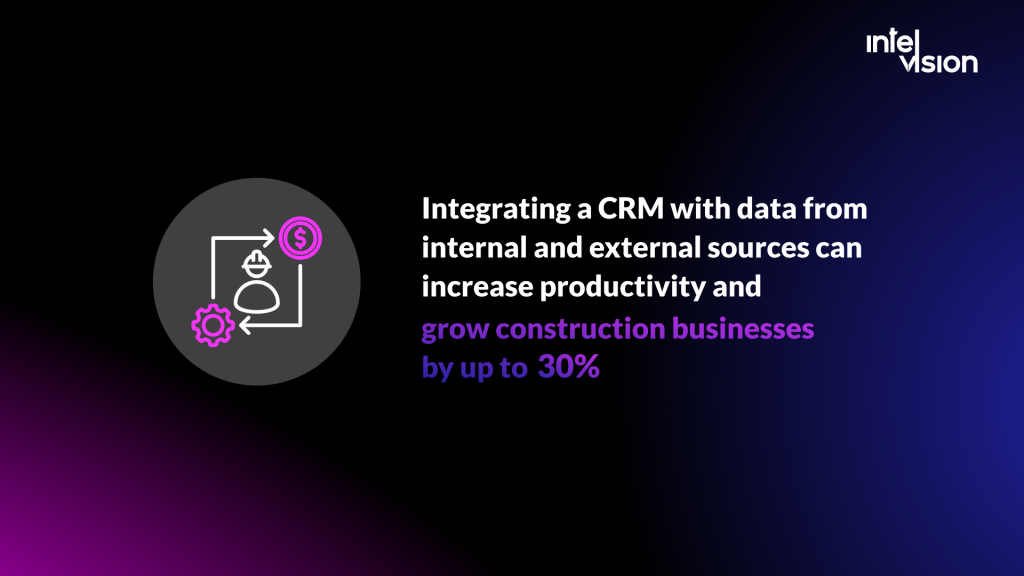
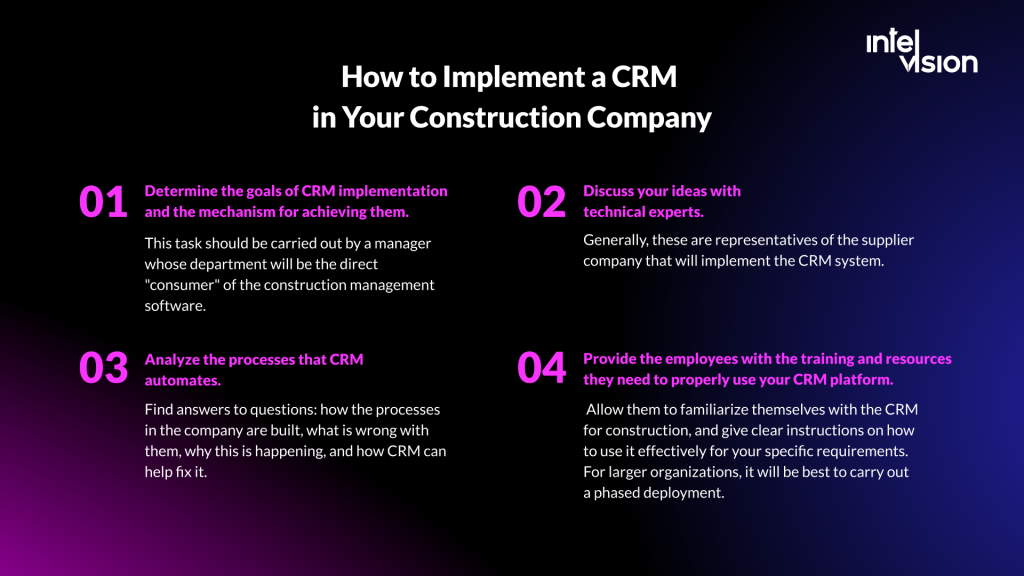

![$portfolio_img_mobile['title'] $portfolio_img_mobile['alt']](https://intelvision.pro/wp-content/uploads/2022/11/Human-Resource-ERP-System.-Mobile-banner-264x350.png)
![$portfolio_logo_light['title'] $portfolio_logo_light['alt']](https://intelvision.pro/wp-content/uploads/2022/11/GetWorker-white-logo.png)

